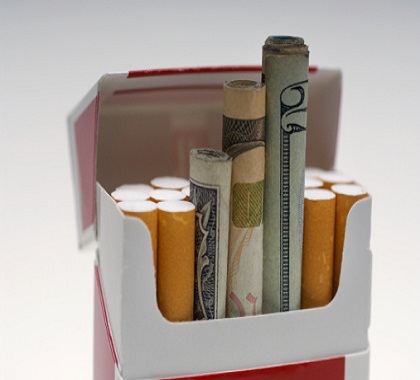Californians will vote in November on whether to increase taxes on combustible tobacco and non-tobacco products, such as e-cigarettes, to fund new proposed increases in health insurance subsidies.
If approved, Proposition 56 would increase the state’s excise tax on tobacco cigarettes from 87 cents to $2.87 and add new tobacco taxes on non-tobacco products, such as e-cigarettes. Currently, e-cigarettes are not taxed as tobacco products in California.
The initiative would divert up to 82 percent of the new tax revenue to payouts for health insurance companies participating in the state’s Medi-Cal entitlement program. Only 13 percent of the estimated $1.6 billion in tax money would go to tobacco cessation and prevention programs.
Predicting Consumers’ Responses
Donald Kenkel, a professor of policy analysis and management at Cornell University’s College of Human Ecology and a research associate at the National Bureau of Economic Research, says consumers’ reactions to price changes aren’t as direct as one might assume.
“The key question is how California consumers will respond to the price increase,” Kenkel said. “Economists are not able to run randomized, controlled experiments to study consumer behavior. Instead, we analyze observational data and try to statistically control for the other factors that influence smoking behavior.”
Kenkel says adding taxes to the price of cigarettes doesn’t reliably reduce consumer demand.
“A $2-per-pack tax increase can be expected to increase the price of cigarettes in California by about 34 percent, to almost $8 per pack,” Kenkel said. “Cigarette demand is very inelastic. Recent evidence suggests the price elasticity of demand might be, at most, -0.1. Given these estimates, it is reasonable to predict that the $2-per-pack tax will cause cigarette consumption to fall by about 3.4 percent. Much of this drop will probably come from current smokers cutting down the number of cigarettes they smoke each day.”
Filling Government Coffers
Kenkel says the ballot measure, if approved, “will probably” benefit government more than it benefits public health.
“It is interesting that a $2 tax hike will probably do more to increase tax revenues than it will do to decrease smoking.”
William Shughart II, research director at the Independent Institute and an economics professor at Utah State University, says history is full of examples of lawmakers using new revenue as slush funds for pet projects.
“The Master Settlement Agreement between the states and Big Tobacco is a poster child: Only five cents of every dollar the states received actually was spent on anti-smoking programs, and less than 30 percent was spent on treating smoking-related diseases,” Shughart said. “Lawmakers are not bound by any promises made about how the new tobacco tax revenues will be spent.”
‘Most Regressive of All Taxes’
Shughart says cigarette taxes have a disparate impact on the people who can least afford them.
“Cigarette taxes are among the most regressive of all taxes levied by state governments,” Shughart said. “Poor people smoke more than rich people, and so they will bear the tax burden more heavily.”




